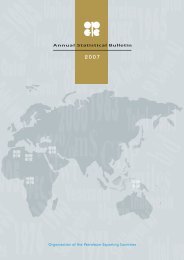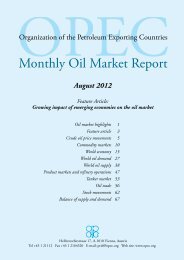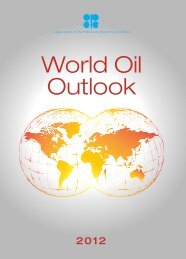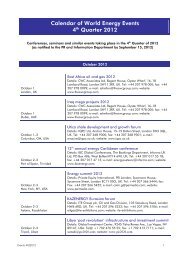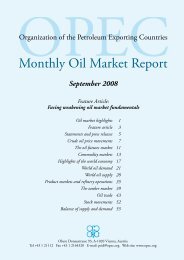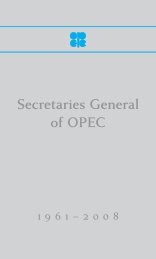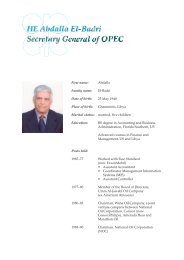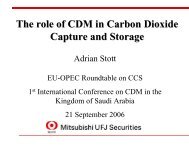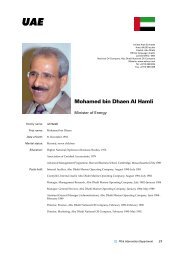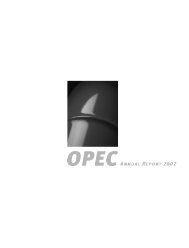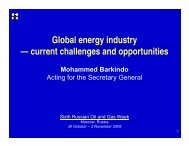2005 - OPEC
2005 - OPEC
2005 - OPEC
Create successful ePaper yourself
Turn your PDF publications into a flip-book with our unique Google optimized e-Paper software.
implementing costly investment plans to accelerate the expansion of crude production capacity<br />
from about 32.5 mb/d to at least 38 mb/d by 2010, to meet future demand growth.<br />
Acknowledging that, although growth in crude oil supply in recent years has continued to<br />
be ahead of growth in demand, and that commercial oil stocks, in particular of crude, are<br />
at comfortable levels, oil prices have, nevertheless, continued to rise, mainly on account of<br />
tightness in downstream capacity and concerns over availability of adequate future supplies<br />
leading to increasing activity in futures markets, the Conference reiterated that the Organiza-<br />
tion will continue its proactive policy of supporting market stability by ensuring availability of<br />
adequate supply, at prices reasonable to both producers and consumers.<br />
Towards this end, and recognising the importance of maintaining oil market stability, for the<br />
benefit of the world economy, including, in particular, the economies of the developing world,<br />
the Conference agreed to make available to the market the spare capacity of around 2 mb/d<br />
in MCs, should it be called for, for a period of three months, starting 1 October <strong>2005</strong>. The<br />
Conference further decided to review market developments at its 138th (Extraordinary) Meet-<br />
ing, to be held in Kuwait on 12 December <strong>2005</strong>, and take decisions as deemed appropriate<br />
and necessary.<br />
The Conference again acknowledged the important role of non-<strong>OPEC</strong> producers in the global<br />
oil industry, and repeated its call on non-<strong>OPEC</strong> oil producers to continue actively cooperating<br />
with <strong>OPEC</strong> in maintaining price and market stability. Similarly, the Conference again called on<br />
all parties concerned to join these efforts to maintain market stability, with reasonable prices<br />
consistent with robust economic growth, as well as steady revenue streams, for producing<br />
countries and the industry, conducive to the expansion of upstream and downstream capacity<br />
to meet rising international demand for oil and products.<br />
Further, the Conference noted that, whilst assurances from <strong>OPEC</strong> of its commitment to meet<br />
supply shortfalls and its readiness to offer additional supplies to the market, should these be<br />
called for, as well as emergency response action taken by the IEA MCs to release petroleum<br />
stocks to overcome temporary refinery shutdowns in the aftermath of Hurricane Katrina, had<br />
provided welcome relief, the continuing shortage of appropriate refining capacity remains one<br />
of the main reasons behind recent oil price increases and price volatility. Applauding the grow-<br />
ing recognition by consumer country governments of the serious refining capacity constraints,<br />
which could pose a threat to future market stability in the next few years, the Conference<br />
repeated its call on industry and consumer governments to urgently address the pressing issue<br />
of refining shortages and to take prompt action to facilitate and speed up refinery capacity<br />
expansion. <strong>OPEC</strong> MCs have taken the initiative – on their own and in partnership with others



